James Herbert Seabrook came to Chelmsford from Boreham as a young boy when his father’s fruit growing and horticultural business expanded. After education at Chelmsford College he joined his father’s business. He was a prominent amateur actor. James joined the army, was awarded an officer’s commission and was sent to France within two weeks of the start of the war and served as a motor cycle dispatch rider. He was killed in action while riding his motor cycle near Gandelu in September 1914 during the Battle of the Marne. James’ home was in Arbour Lane. His mother lived to the age of 100.
SEABROOK, JAMES HERBERT,
Temporary 2nd Lieutenant, the 5th Signal Troop, Royal Engineers, attached to 5th Cavalry Brigad
The same edirion also reported:
“Lieut. Seabrook’s End - ‘A glorious death’ – Lieut. John French Blake, commanding the 5th Signal Troop RE, writes explaining how Lieut. Seabrook met his untimely end:
‘Lieut. Seabrook was killed while carrying out his duty. He had done splendid work for us as a motor cyclist dispatch rider and was immensely popular with all. The circumstances of his death were these. We were in touch with the Germans early in the morning, and moved to turn their flank. I sent Lieut. Seabrook to the Headquarters of the 2nd Army with a message before this, and when he returned to the point of dispatch we had gone. He was told by another of my motor cyclists where we had gone, and which road to take, but he appears to have missed his way, taken a wrong road, and run straight into the enemy. The end must have come very quickly and painlessly as he was shot in the head – two other bullets also found their mark.
All this we found later in the day as we were in action all the forenoon, and I was not informed of his death until late in the evening, when I am glad to say we had gained a decisive success, routing the Germans and inflicting casualties (500 odd killed, wounded and prisoners) on them.
I cannot say more of this sad time, except that Lieut. Seabrook died a glorious death - - which we must all be prepared for - - doing his duty and in service of his country’.”
While the Essex Weekly News of 25th September 1914 carried a similar account:
“How Lieut. Seabrook was killed - ‘A glorious death’ – The manner in which Lieut. Seabrook lost his life in the services of King and country is described in a letter received by his mother at Springfield from the deceased officer’s Commander, Lieut. John Ffrench Blake, Lieut. Commanding 5 Signal Troop. This letter was send from ‘5 Signal Troop, R.E., Headquarters 5th Cavalry Brigade, Expeditionary Forces under date Sept. 11,and we are permitted to make the following extracts:
‘It is with the greatest sorrow that I have to write to tell you that your son was killed yesterday while carrying out his duty.
He was sent to me some weeks ago as a motor cyclist dispatch rider, and had done splendid work for me and was immensely popular with all. The circumstances of his death were these -
We were in touch with the Germans early in the morning, and moved to turn their flank. I sent your son to the Headquarters of the Second Army with a message before this, and when he returned to the point of dispatch we had gone. He was told by another of my motor cyclists where we had gone, and which road to take, but he appears to have missed his way, taking a wrong road, and ran straight into the enemy.
The end must have come very quickly and painlessly as he was shot in the head. Two other bullets also found their mark.
All this we found later in the day as we were in action all the forenoon, and I was not informed of his death until late in the evening, when I am glad to say we had gained a decisive success, routing the Germans and inflicting casualties (500 dead, killed, wounded and prisoners) on them.
I cannot say more at this sad time, except that your son died a glorious death, which we must all be prepared for, doing his duty and in service of his country’.”
Three weeks later the Essex County Chronicle provided further detail on James’ death and burial:
“The late Lieut. Seabrook – Buried in French churchyard – From further letters received by Lieut.’s brother officers, the exact manner in which he met his death will probably never be known. One account suggests that he was waylaid by German stragglers, as he was found dead by one of the doctors accompanying the ambulance after the fight, The place was Gandelu, and he was buried in the churchyard of this village on the evening of the 10th September.
Lieut. Blake writes to Mrs. Seabrook: ‘I cannot tell you how sorry I was to lose him. He was a most capable dispatch rider – cool, and full of common-sense; nothing disturbed his equanimity at all, and he was perfectly cool under fire, and always smiling, His fellow officers called him ‘Sunny Jim’, because of his cheeriness. He has a beautiful resting place, and it is a great consolation that he rests in consecrated ground.’
Gandelu is about six miles east of Crony-Qus-Oureq, and about 18 miles NE of Meaux. It is on the river Chignon and on the main road from Chateau Thierry to Monsigory, Pallin, and almost due south of La Ferke Milon.
It is an interesting coincidence at Lieut. Seabrook, the descendent of an old Huguenot family on his mother’s side (Pertwee, Pertins, who settled near Langenhoe, Essex, on being expelled from heir native country, by the revocation of the Edict of Nantes), should have died fighting in, and for that country, allied with Great Britain.
Telegrams have been received by his family from the King and Queen and Lord Kitchener, expressing their deep sympathy.”
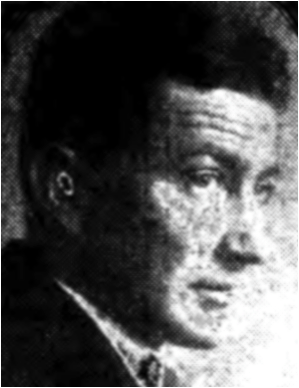
James was born at Brent Hall in Boreham on 30th October 1883, the fourth son of William Seabrook and Elizabeth Mary Ann Seabrook (Pertwee). His father had been born in 1850; his mother, c1852; both at Boreham.
His mother’s family had Huguenot ancestry as had originally been named Pertuis. James’ parents had married on 23rd April 1874 at St. Andrew’s Church in Boreham. At the time James’ father was a farmer of Boreham, the son of William Seabrook, also a farmer. James’ mother was also of Boreham, the daughter of James Pertwee, another farmer.
In 1881 the couple had been living at Brent Hall, Boreham where James’ father farmed 233 acres of land.
James’ brothers and sisters were; Arthur Hugh Seabrook (1875-1949), Ernest Seabrook (1877-1971), Ethel Marion Seabrook (born in 1878), William Pertwee Seabrook (1882-1963), twins Alice M. Seabrook and Eva Seabrook (born in 1887). All bar the twins, who were born in Springfield, were born at Boreham.
Around 1887 the family had moved from Boreham to Springfield. The 1891 census
found James living with his parents, six siblings and two servants at 1 Arbour Lane (The Bungalow) in Springfield, a site off the western side of the lane, today redeveloped as Hill View Road. James’ father’s occupation was recorded as a ‘seed grower’.
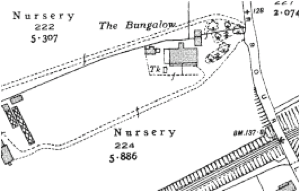
James was educated at Chelmsford College
The 1901 census found the family remaining at The Bungalow. James, now 18, was employed as a fruit grower, no doubt with his father’s business. Apart from his parents, the rest of James’s household included his three sisters, three boarders and a servant.
In 1911 the census recorded James living with his parents, two sisters (Ethel and Maud) and a servant at the same address. He was described as a partner in his father’s fruit growing business, Messrs. W. Seabrook and Sons.
Away from work James was a member of Chelmsford’s Amateur Dramatics Club, where he usually took the role of leading man. In December 1912 he was Phenyl in a performance of Arthur Pinero’s play ‘Sweet Lavender’. A report in the local press hailed it as ‘an unqualified success’. James’ performance received the following review:
“Mr. C. L. Arnold and Mr. J. H. Seabrook were splendid in their impersonations of Hale and Phenyl,especially the latter, who provoked roars of laughter by his humorous quips and remarks.”
The following year he received similar praise in the Essex County Chronicle for his performance in ‘A Single Man’ at the Chelmsford Empire in Springfield Road. The production raised ten guineas for the Chelmsford & Essex Hospital.
“Robin Worthington was undertaken by Mr. J. H. Seabrook. His acting was excellent throughout.”
On 1st July 1914 James performed in ‘An Important Omission’ at a fete at St. John’s Vicarage to raise funds for the church. One of his three co-actors was Charles Anthony Haig, who was also to lose his life in the war.
James was a member of Chelmsford Golf Club and was a keen motor-cyclist, evidenced by his appearance before Chelmsford’s magistrates on 17th July 1914, which led to the following report in the Essex County Chronicle:
“Midnight Noise.—James Herbert Seabrook, nurseryman, Chelmsford, was summoned for driving a motor cycle without a licence at Chelmsford on July 10.- Inspector Barrow said he stopped defendant at midnight owing to the noise which his motor cycle was making, and spoke to him about the silencer. Witness then asked him for his licence, and found it had expired on June 30. this being ten days out of date. Defendant, who was represented by Mr. P. J. Ward, said he had not noticed that his licence had expired.—The Chairman said the would be dismissed on payment of 4s. costs”
At the outbreak of the war James volunteered to work as as a despatch rider, and was given a commission as 2nd Lieutenant, in the 5th Signal Troop Royal Engineers attached to the 5th Cavalry Brigade. He left England with the Expeditionary Force on 12th August 1914.
On 10th September 1914, during the Battle of the Marne, James was sent to take a message to the Headquarters of the Second Army. By the time he returned to the point of dispatch his unit had moved elsewhere. He was given directions to reach them but he took a wrong road, and ran into German troops who shot him three times and killed him. He was aged 30. Afterwards it would emerge that all of his kit was with him on the motor cycle and was taken by the enemy before his body was recovered later in the day. A belt containing £12 and some letters were found under his clothes and were sent to his mother by Captain Blakie of the 5th Signal Troop, Royal Engineers.
Seven days after his death James’ father received a telegram informing him of his son’s death.
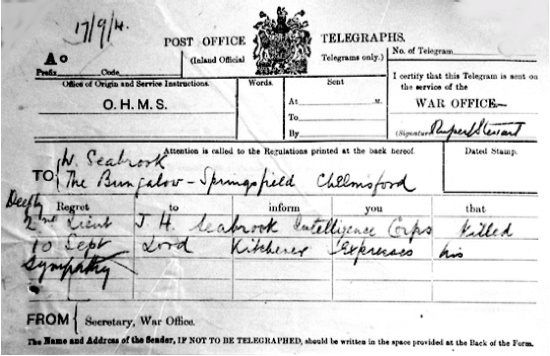
On 18th September 1914 the Essex Weekly News reported:
“Lieut. J. H. Seabrook was a son of Mr. and Mrs. W. Seabrook of The Bungalow, Arbour Lane, Chelmsford. At the outbreak of the war he volunteered as a motor-cycle dispatch rider, and was accepted for service, being granted a Lieutenant’s commission and attached to the 5th Cavalry Brigade. He left England on August 12, and since his departure his relatives had received three letters from him; one so recently as Wednesday last. He was 30 years of age, and was associated with his father in the well-known horticultural business of Messrs. W. Seabrook and Sons. He was popular and esteemed among a large circle of friends. An amateur actor of more than ordinary ability, Lieut. Seabrook took a leading part in the productions of the Chelmsford Amateur Dramatic Club, of which he was hon. treasurer. He usually appeared in the leading man’s part, and always scored a success. The news of Lieut. Seabrook’s death was conveyed to his father yesterday in a telegram from the Intelligence Department of the 5th Cavalry Brigade, advanced base. The telegram stated that the deceased officer was killed on 10th inst. The greatest sympathy will be extended to Mr. and Mrs. Seabrook and their family in their bereavement they have so suddenly been called upon to bear.”
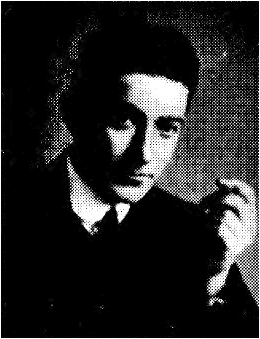
A week later the Essex County Chronicle of 25th September 1914 carried a very similar report:
“Lieut. James H. Seabrook, the talented son of Mr. and Mrs. W Seabrook, of the Bungalow, Arbour Lane, Chelmsford, was killed in France on the 10th inst. At the outbreak of war he volunteered as a motor-cycle dispatch rider, and was accepted for service, being granted a Lieutenant’s commission and attached to the 5th Cavalry Brigade. He left England on August 12, and since his departure his relatives have received three letters from him, one so recently as Wednesday last. He was 30 years of age, and associated with his father in the well-known horticultural business of Messrs, W. Seabrook and Sons. He was very popular and highly esteemed among a large circle of friends. An amateur actor of acknowledged ability, Lieut. Seabrook took a leading part in the productions of the Chelmsford Amateur Dramatic Club, of which he was hon. treasurer. The news of his death was conveyed to his father in a telegram from the Intelligence Department of the 5th Cavalry Brigade advance base."
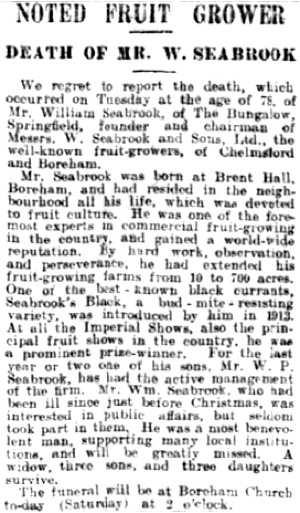
An almost identical report was in the day’s Essex Weekly News - the immense detail in the newspaper reports was in stark contrast to those later in the War when many of the fallen only had their names and regiments listed in the press.
He is buried in the south-west corner of Gandelu Communal Cemetery, Aisne, France, one of five British soldiers, all killed the same day.
James is commemorated on the Civic Centre Memorial, Chelmsford and on the Springfield Parish Memorial at All Saints’ Church. He was entitled to the 1914-15 Star, British War Medal, and Victory Medal. James left an estate worth £2,324 4s 9d.
His parents, brother William and sister Ethel were all listed at The Bungalow in the 1918 register of electors (later numbered 75 and 77). William’s father died in 1929, aged 78, leaving an estate worth £6306 7s 6d. His mother lived to be 100 and died in 1952.
James’ brother William Pertwee Seabrook, was one of the pioneers of fruit-growing in England. After becoming involved in his father’s business in 1903 he was the first to introduce a mechanical apple grader and automatic fruit spraying technique. For his services to fruit-growing he was awarded the O.B.E.
140103